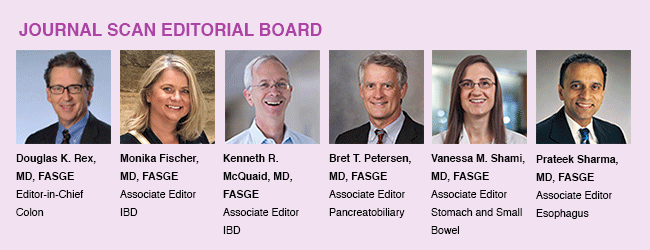Endoscopic submucosal dissection (ESD) is an effective strategy for complete resection of superficial esophageal neoplasia. However, such lesions in patients with cirrhosis and portal hypertension
endoscopic submucosal dissection
endoscopic submucosal dissection
ESD Is Safe and Effective for Esophageal Lesions in Cirrhotic Patients With Small Esophageal Varices
Predictors of Prolonged Rectal Endoscopic Submucosal Dissection
In a Japanese experience of endoscopic submucosal dissection (ESD) performed on 483 rectal lesions over 23 years, a prolonged ESD was considered longer than 120
Combined EMR and Full-Thickness Resection for Large Nonlifting Colorectal Adenomas
Endoscopic submucosal dissection (ESD) is an option for scarred, large colorectal adenomas that do not lift well and/or contain a suspicious area of an advanced
71% of U.S. ESD Patients in Study Were Discharged Without Hospital Admission
Endoscopic submucosal dissection (ESD) is frequently followed by hospital admission for multiple days in Asian countries. However, hospitalization is much more expensive in the U.S.,
Randomized Controlled Trial Shows Hemostatic Peptide Solution TDM-621 Reduces Need for Coagulation Forceps Treatment During ESD by 80%
Bleeding can be problematic during endoscopic submucosal dissection (ESD). The bleeding point may be difficult to identify, and coagulation may lead to muscle injury and
Favorable Long-Term Outcomes With ESD for Esophageal Squamous Cell Cancer
Endoscopic resection is a minimally invasive and curative treatment option for those with superficial esophageal squamous cell carcinoma (ESCC). Endoscopic submucosal dissection (ESD), although more
Endoscopic Submucosal Dissection Plus Radiofrequency Ablation Exhibits High Eradication Rates in Patients With Barrett’s Esophagus
Current strategies for the endoscopic treatment of Barrett’s esophagus (BE) focus on resection of nodular lesions within BE and then the ablation of the flat
Predicting Residual Neoplasia Risk After “Noncurative” Endoscopic Submucosal Dissection for Malignant Colorectal Lesions
This is a retrospective study from 15 Western centers performing colorectal endoscopic submucosal dissection (ESD) in Europe and Australia. A curative resection was defined as
Tip-in EMR Compared With ESD for 20- to 30-mm Nonpedunculated Colorectal Neoplasms
Tip-in endoscopic mucosal resection (EMR) involves submucosal injection, followed by an incision on the proximal side of the injection mound using a snare tip with
Pilot Study Finds Submucosal Thickness Is Greater With Colorectal EMR Than ESD
Discussions of colorectal endoscopic mucosal resection (EMR) versus endoscopic submucosal dissection (ESD) usually focus on en bloc resection and recurrence rates. Little is known about
Endoscopic Submucosal Dissection of Lesions at the Dentate Line Compared With Rectal Lesions Above the Dentate Line
This systematic review and meta-analysis sought to quantify the differences in outcomes after endoscopic submucosal dissection (ESD) of rectal lesions at the dentate line versus
Prospective Comparison of Needle Knives With Scissor Knives for Colorectal Endoscopic Submucosal Dissection
This is a post-hoc propensity score-matched analysis of 2498 colorectal lesions removed with needle-type or scissor-type knives for endoscopic submucosal dissection (ESD) in 11 Japanese
Salvage Endoscopic Submucosal Dissection After Chemoradiation for Locally Advanced Rectal Cancer
Patients with locally advanced rectal cancer who undergo neoadjuvant chemoradiation sometimes have remarkable responses to treatment. These may include evidence of no residual disease or
Robotic Endoscopy Improves Efficacy and Safety of Endoscopic Submucosal Dissection
Endoscopic submucosal dissection (ESD) is technically difficult and relies on appropriate countertraction and visibility to safely remove lesions of interest. Robot-assisted endoscopy has been under
Endoscopic Intermuscular Dissection for Deep Submucosal Invasion in Rectal Cancer
Endoscopic submucosal dissection (ESD) for T1 rectal cancer can leave positive margins, particularly for lesions invasive to the middle or deep thirds of the submucosa.
Endoscopic Submucosal Dissection for Early Colorectal Cancer and High-Risk Surgery: Okay to Not Operate
This study investigated outcomes in patients who underwent endoscopic submucosal dissection (ESD) for T1 colorectal cancer (CRC) and then had adverse histologic features that predict
Endoscopic Submucosal Dissection Use Changes Histologic Diagnosis in More Than Half of All Patients With Visible Barrett’s Esophagus Neoplasia
Endoscopic mucosal resection (EMR) and endoscopic submucosal dissection (ESD) have emerged as important treatment techniques for patients with visible lesions in Barrett’s esophagus (BE). Whereas
Transferring Endoscopic Submucosal Dissection Skills From Hands-on to Human Cases
This report from The Netherlands describes the results of a survey of 118 participants in an endoscopic submucosal dissection (ESD) training workshop using live porcine
Perioperative Antibiotics Did Not Prevent Postendoscopic Submucosal Dissection Coagulation Syndrome in Study
Postendoscopic coagulation syndrome (PECS) is common after endoscopic submucosal dissection (ESD), and prior data have indicated that perioperative antibiotics reduced the syndrome. In this Japanese
High Success Rates for Endoscopic Submucosal Dissection in Prospective North American Study
There are limited data on success rates of endoscopic submucosal dissection (ESD) in North America. In this study, 10 centers in the United States and
Europeans Report Japanese-Like en Bloc and R0 Colonic Endoscopic Submucosal Dissection Rates Using Double-Clip Traction
Colonic endoscopic submucosal dissection (ESD) is generally considered more challenging than esophageal, stomach, or rectal ESD. The authors have previously described a double-clip traction (DCT)


